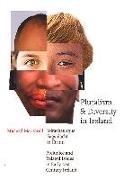Read more
Pluralism and Diversity in Ireland (2011) is based on a National Survey of attitudes and opinions in the Republic of Ireland in 2007-08 and marks the third book in a trilogy on the subject of prejudice and tolerance in Irish society. The current survey traces changes in Irish social prejudices over a period of thirty-five years. The two previous publications were: Prejudice and Tolerance in Ireland (1977), based on a survey of Greater Dublin intergroup attitudes in 1972-73, and Prejudice in Ireland Revisited (1996), based on a National Survey of attitudes in 1988-89. Significant cultural, economic, political, religious and social changes have taken place in Ireland between 1972-73 and 2007-08, including the end to a prolonged period of paramilitary violence in Northern Ireland. The positive change in attitudes towards Northern Ireland and Britain reported in this text reflects the peaceful outcome of the Northern Ireland Troubles.
Among the factors which contributed to the reduction of social prejudice over the period 1988-89 to 2007-08 were: an increase in economic security as a result of the 'Celtic Tiger' and the favourable contact with immigrant workers of different nationalities. This book gives a comprehensive insight into many aspects of society in the Republic of Ireland. The results point to the viability of a pluralist Ireland which ensures equality for culturally, politically and religiously-diverse groupings and categories. The realisation of such a society will require collaborative efforts from all sections of Irish society, both statutory and voluntary. This publication, it is hoped, will contribute to the achievement of a greater pluralism in Ireland in the twenty-first century. The findings are, for the most part, positive and confirm greater tolerance towards various ethnic, gender, political, racial, religious and social categories. There are, however, negative findings in Irish attitudes towards certain categories which merit further research and attention. As Ireland becomes more 'diverse' in its population, there will be a greater need for adequate Minority Rights' Legislation.

